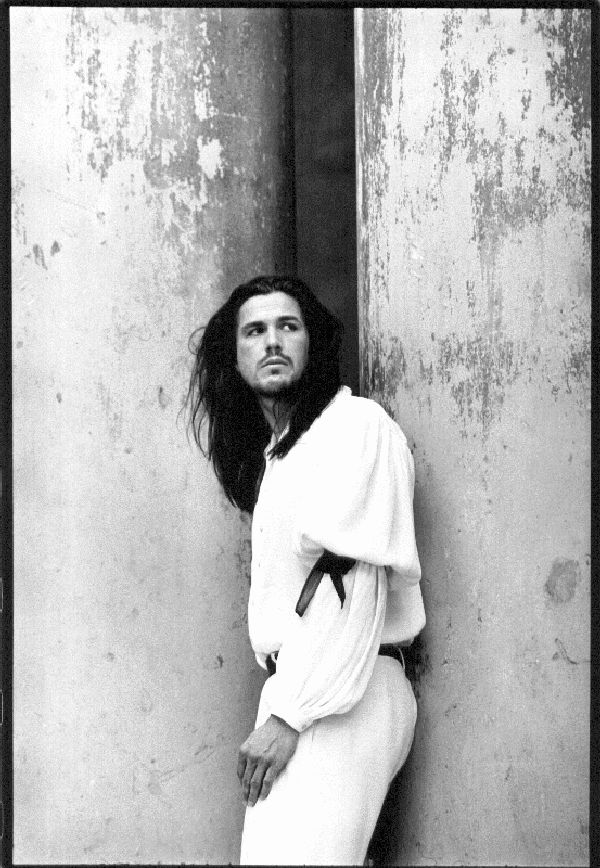
photo: Stefan Gloede
Joerg
Waschinski was born in 1966 in Berlin, where he initially graduated in Church music studies, so that he could study singing as a male soprano with Prof. Renate Faltin at the Hochschule für Musik Hanns Eisler in Berlin. Master classes, among others with Peter Schreier, Elio Battaglia und Barbara Schlick and regular stylistic work with Scor Weir supplemented his studies.
Since in 1996 the sopranist was among the laureates of the International Johann-Heinrich-Schmelzer competition in Melk (Austria) and won the special prize of the "Deutscher Bühnenverein" at the "Bundeswettbewerb" for singing in 1996 in Berlin, he is in whole Europe a sought after singer for opera and oratorio performance. The magazin Opernwelt appointed him the young singer of the season 1999/2000.
His extraordinary voice predestines Waschinski in particular for the presumably lost parts of the legandary Baroque castratos, as well as for works of the early classical period up to Mozart (e.g. Cherubino, Sextus, Aminta). His engagements brought him together with well-known conductors like Ton Koopman, Hermann Max, Frieder Bernius, Reinhard Goebel, Michael Hofstetter, Bruno Weil and Jos van Veldhoven.
On stage, he also gave proof of his acting talent in a series of main parts. In the rôle of Serse in the opera with the same name by G. Fr. Handel, he made his debut with a sensational success at the Stadttheater St. Gallen (Switzerland) in 1998, where he sang again two years later in Teofane von Antonio Lotti. In Monteverdi's opera L'incoronazione di Poppea he became the celebrated star as Nerone in Philipp Himmelmann's staging in Hannover in the 2000/2001 season. The scenic production of Kurt Weill's Die Sieben Todsünden (The Seven Deadly Sins) in Dessau, where Waschinski sang and performed the part of Anna I became an event. In the Handel oratorio Saul at the Oper Bonn, staged-managed by Dietrich Hilsdorf he advanced as David to become the favorite of the audience and the critics of the always sold out successful piece. In the same part, he was also convincing in the spectacular Saul-staging by Georges Delnon on the occasion of the re-opening of the Staatstheater in Mainz (Germany), which moreover was a live TV broadcast.
For his Nerone in Hannover and his David in Bonn Waschinski was nominated by Opernwelt as the best singer of the season 2000/2001.
Among the numerous CDs of Joerg
Waschinski, the "Echo-Klassik-Preis" winning opera recording Endimione by Johann Christian Bach under Bruno Weil and the recording of the oratorio Giob by Carl Ditters von Dittersdorf under Hermann Max, which received the "Preis der Deutschen Schallplattenkritik 2002", should be mentioned in particular.
Source: Waschinski website.
|
|
|
George Frideric Handel: Die Zauberinsel der Alcina (excerpts),
George Frideric Handel: Clori, Tirsi e Fileno (cantata),
Musik der Wiener Hofkapelle (Music at the Vienna court chapel),
Leopold I: Sacred Works,
Joseph I, Ferdinand III, Leopold I: Sacred Works,
Niccolò Jommelli: Il Vologeso (opera seria),
Tiroler Tage für Kirchenmusik 1998: Benedikt Anton Aufschnaiter,
Nicola Porpora: Il Gedeone (oratorio),
Felix Mendelssohn-Bartholdy: Elias (oratorio),
Private production of the Kammerchor Collegium Vocale Innsbruck (2CDs)
Johann Christian Bach: Endimione (serenata),
Tiroler Tage für Kirchenmusik 1999: Johann Georg Tschortsch,
Musica Sacra 2000: Ambrosius Reiner,
Tiroler Tage für Kirchenmusik 2000,
Tiroler Passions- und Osterkonzert 2000,
C. Ditters von Dittersdorf: Giob (oratorio),
Johann Christian Bach: La clemenza di Scipione,
Tiroler Passions- und Osterkonzert 2001,
Joseph Schuster: Demofoonte (opera seria),
Hofmusik auf Schloss Ambras: Alexander Utendal,
Tiroler Tage für Kirchenmusik 2002, Stift Stams,
Thomas Bloch: Missa Cantate,
Giovanni Battista Pergolesi: Stabat mater, Salve Regina,
25. Josef Myslivecek: La Passione di Nostro Signore Gesu Cristo,
|
|
|
Listen to Joerg Waschinski
|
|
What is that after all, a sopranist?
What differentiates it from countertenor or male alto?
Joerg Waschinski : "A question, about which Jochen Kowalski has already talked till he is blue in the face. Basically, I would rather say "countertenor" is a register indication, a generic term. And because now more and more countertenors emerge, it proved to be reasonable, to further differentiate the register like in other voice categories. 'Alto' and 'Sopranist' then simply would become vocal pitch description. But there is no uniform terminology within this area. Many altos also understand this designation as a differentiation from the countertenors and want to express the fact that they sing quite bodyless. That would correspond to for instance the contrast between lyric and dramatic."
A special physical disposition required for men to sing in the soprano range?
Joerg Waschinski : "Every singer can sing falsetto and with healthy voice, that can also cause no harm. How it sounds and how one can use it, that is another question. I think that the quality of the sound and the resonance depends already a few of the physiognomy and anatomy.
(Source: Musik & Theater October , Reinmar Wagner , 1998)
|
|
Joerg Waschinski: "My voice has already inclined to the falsetto because I could not tackle the change of registers. It was much strain for me to hold the note without inclining to the falsetto."
|
|
Joerg Waschinski
Management
|